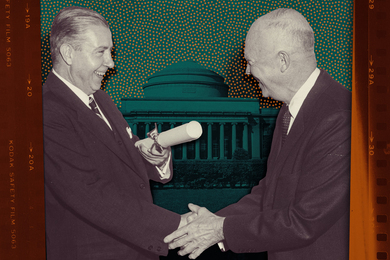Several news organizations, including the Tech, have reported a statement by an attorney that his client, a 1998 MIT graduate, has had his diploma revoked for five years because of his actions preceding the death of freshman Scott Krueger in 1997.
The Boston Herald reported on July 30 that the lawyer, Timothy Burke of Needham, said that he planned to sue MIT to restore the degree of Charles Yoo, 23, of Philadelphia. He said the MIT Committee on Discipline (COD) had rendered its decision following a hearing on July 28.
After the Suffolk County Grand Jury concluded its investigation last fall into Mr. Krueger's death, the district attorney said a pledge trainer for Phi Gamma Delta had provided whiskey and beer for freshman pledges in an organized hazing event. The Herald identified Mr. Yoo as the pledge trainer.
The press reports have raised questions about the disciplinary process at the Institute. This article addresses the process, not the case itself. In accordance with MIT policy and US Department of Education regulations, MIT officials cannot comment on private matters of student discipline, even when the student himself has disclosed some of the relevant information.
The policies and procedures of the COD are available on the web site at http://web.mit.edu/committees/cod/.
Also relevant are the policies governing "Student Conflict Resolution and Discipline at MIT" -- which includes "Summary of ODSUE Conflict Resolution Options/ODSUE and COD Disciplinary Procedures" -- at http://web.mit.edu/committees/conf-res/.
SUMMARY
The following is a summary of the policies and procedures relating to hearings by the Committee on Discipline.
A standing committee of the faculty, the Committee on Discipline consists of six elected faculty members, three undergraduates, two graduate students and a designee of the dean of students and undergraduate education. The current chair is Professor Stephen C. Graves. The committee holds closed hearings on allegations of misconduct made against students and imposes sanctions when warranted.
A majority of the committee members is required in order to convene a hearing. The accused student is provided with a written copy of the charges prior to the hearing, including the names of witnesses and copies of documents to be presented.
A written response to the charges must be filed with the committee within 10 days. Students charged may engage any member of the MIT community as an advisor to help prepare their defense.
At the hearing, the accused student is given the right to testify and to present witnesses on his or her behalf, as well as to ask questions of other witnesses. The advisor to the accused may speak at the hearing and interrogate witnesses with the permission of the chair. Lawyers for the accused student are not permitted to attend a hearing except in unusual cases when the committee chair allows it.
The formal rules of evidence do not apply. The standard of guilt is "a preponderance of the evidence." A majority of the committee members at the hearing is required for a verdict. Deliberations are conducted in executive session.
The committee may impose any sanction it considers appropriate. Committee procedures specifically provide that degrees may be revoked if a case is brought after graduation. The withdrawal may be for a specified period of time after which the degree will be reinstated (the equivalent of suspension from the Institute) or it may be without limit of time (the equivalent of expulsion).
If suspension, expulsion or revocation of a degree is called for, a recommendation is sent to the president of the Institute, who makes the final decision. If the president supports such a recommendation, the accused may request reconsideration.
A version of this article appeared in the September 11, 1999 issue of MIT Tech Talk (Volume 44, Number 2).





